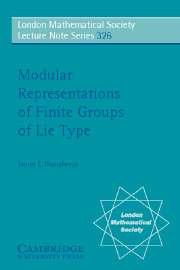Book contents
- Frontmatter
- Contents
- Preface
- 1 Finite Groups of Lie Type
- 2 Simple Modules
- 3 Weyl Modules and Lusztig's Conjecture
- 4 Computation of Weight Multiplicities
- 5 Other Aspects of Simple Modules
- 6 Tensor Products
- 7 BN-Pairs and Induced Modules
- 8 Blocks
- 9 Projective Modules
- 10 Comparison with Frobenius Kernels
- 11 Cartan Invariants
- 12 Extensions of Simple Modules
- 13 Loewy Series
- 14 Cohomology
- 15 Complexity and Support Varieties
- 16 Ordinary and Modular Representations
- 17 Deligne–Lusztig Characters
- 18 The Groups G2(q)
- 19 General and Special Linear Groups
- 20 Suzuki and Ree Groups
- Bibliography
- Frequently Used Symbols
- Index
2 - Simple Modules
Published online by Cambridge University Press: 23 November 2009
- Frontmatter
- Contents
- Preface
- 1 Finite Groups of Lie Type
- 2 Simple Modules
- 3 Weyl Modules and Lusztig's Conjecture
- 4 Computation of Weight Multiplicities
- 5 Other Aspects of Simple Modules
- 6 Tensor Products
- 7 BN-Pairs and Induced Modules
- 8 Blocks
- 9 Projective Modules
- 10 Comparison with Frobenius Kernels
- 11 Cartan Invariants
- 12 Extensions of Simple Modules
- 13 Loewy Series
- 14 Cohomology
- 15 Complexity and Support Varieties
- 16 Ordinary and Modular Representations
- 17 Deligne–Lusztig Characters
- 18 The Groups G2(q)
- 19 General and Special Linear Groups
- 20 Suzuki and Ree Groups
- Bibliography
- Frequently Used Symbols
- Index
Summary
To study the representations over K of an arbitrary finite group G, one usually concentrates first on those which are realized within the group algebra KG. The main examples are simple modules and projective modules.
When G is a finite group of Lie type, there are two natural approaches to the study of simple KG-modules:
Describe them intrinsically in the setting of groups with split BN-pairs.
Describe them as restrictions of simple modules for the ambient algebraic group G.
While the second approach is less direct, it has yielded (so far) much more detailed information than the first approach and will therefore be our main focus here. We defer until Chapter 7 the more self-contained development due to Curtis and Richen, based on BN-pairs.
Even though it is possible to classify the simple KG-modules in a coherent way from the algebraic group viewpoint, we still do not know in most cases their dimensions or (Brauer) characters. Modulo knowledge of the formal characters of simple G-modules (still incomplete in most cases), which we call standard character data for G, it is often possible to derive further results about the category of finite dimensional KG-modules: projectives, extensions, etc. This is usually the approach we follow, motivated by Lusztig's Conjecture for G (see 3.11 below).
After a detailed review of simple modules for the algebraic groups, following [RAGS], we turn to the finite groups.
- Type
- Chapter
- Information
- Modular Representations of Finite Groups of Lie Type , pp. 9 - 20Publisher: Cambridge University PressPrint publication year: 2005



